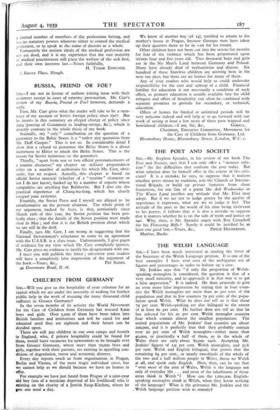CHILEREN FROM GERMANY sut,—Wiii you give us the hospitality of
your columns for an appeal which we are under the necessity of making for further public help in the work of rescuing the many thousand child sufferers in Greater Germany?
In the seven months of its activity the World Movement for the Care of Children from Germany has rescued 8,000 boys and girls. Over 5,000 of them have been taken into British families and institutions and will be cared for and educated until they are eighteen and their future can be decided upon.
There are still 300 children in our own camps and hostels in England, who, if private hospitality could be found for them, would leave vacancies for newcomers to be brought over from Greater Germany, where more than 70,000 boys and girls, together with their parents, are existing in appalling con- ditions of degradation, terror and economic distress.
Every day reports reach us from organisations in Prague, Berlin and Vienna, of the most tragic individual cases, but we cannot help as we should because we have no homes to offer.
For example we have just heard from Prague of a nine-year old boy (son of a musician deprived of his livelihood) who is existing on the charity of a Jewish Soup-Kitchen, where he gets one meal a day. We know of another boy (of 14), terrified to return to his mother's house in Prague, because Gestapo men have taken up their quarters there to lie in wait for his return.
Other children have not been out into the streets for months for fear of the violence which has been perpetrated upon infants four and five years old. Two thousand boys and girls are in the No Man's Land between Germany and Poland. Many have already died of malnutrition and disease. Six hundred of these Stateless children are arriving here in the next ten days, but there are no homes for many of them.
Any of your readers who would help us could undertake responsibility for the care and upkeep of a child. Financial liability for education is not necessarily a condition of such offers, as primary education is usually available free for child refugees and offers of hospitality can often be combined with separate promises to provide for secondary, or technical, education.
Offers of homes for limited or unlimited periods will be very welcome indeed and will help us to go forward with our work of saving at least a few more of these poor trapped and bewildered children.—I am, Sir, &c., GORELL. Chairman, Executive Committee, Movement for the Care of Children from Germany, Ltd. Bloomsbury House, Bloomsbury Street, London, W.C. r.








































 Previous page
Previous page